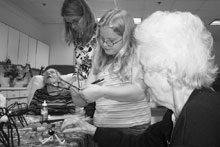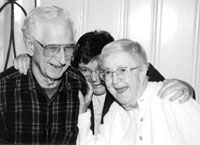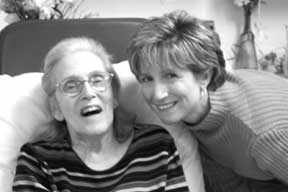
|
 |
Living in a healthy sandwich means finding a way to meet everyone’s needs and work together as a family. Turn to family members to make everyday tasks easier. Make sure everyone takes part. Credit: Deb Alden |
Many members of the sandwich generation are baby boomers who delayed having families to pursue careers. Now, in addition to their jobs, they find themselves driving their parents to the doctor and their children to daycare; using their lunch break to buy diapers and adult incontinence briefs; reading bedtime stories and legal documents about Medicaid and end-of-life directives.
"You’re just pulled in all directions," says Laura Murphy, director of community programs at the Champlain Valley Agency on Aging in Burlington. "It means less time for your marriage, less time for your children and less time for yourself."
The caregiving trend can only be expected to continue as health care improves and Americans live longer. Meanwhile, the responsibilities of these sandwiched providers are expanding to include care for grandchildren, extended family members, and friends. A 2000 study by the National Family Caregivers Association found that more than one-quarter of the adult U.S. population, or about 50 million people, had provided care for an ill, disabled, or aged family member or friend in the past year.
Vermont is no exception.
"We have children in their 70s calling about 90-year-old parents; we have children in their 30s calling about 70-year-old parents; and we have people in their 20s calling about their grandparents," Murphy says.
The price the sandwich set pays for trying to be everything to everyone can be high, experts in the field say.
"They seem to be so busy with everything that they just get on this treadmill and hardly realize how much they’re doing," says Sylvia Boyea, a registered nurse who leads a caregiver support group at Elderly Services, a non-profit Middlebury agency that offers elder and family counseling, education, medical assistance, transportation, and an adult day program.
There are financial costs stemming from wages lost or expenses incurred while caring for aged parents; professional costs of deferred or sidelined careers; social costs due to lack of time for friends.
Health problems are not uncommon. Health workers note that caregivers may appear haggard and tired, or suffer more from depression, colds, headaches, and backaches. A 2001 national survey by the American Association of Retired Persons (AARP) found that one-third of sandwich generation members caring for children and parents or in-laws reported feeling stressed.
Emotional costs can also add up. Caregivers often struggle with the pain of seeing elderly parents deteriorate and the confusion of having to assume the role of the parent. They feel guilty because they think they’re not doing enough, and angry about having no time for themselves and no help from others. They feel torn between spending time with their children or their parents. Family life may suffer because of rivalry between the elders and children for the caregiver’s attention.
And then there’s the grim realization that their elderly parents are
likely to continue going downhill, with care for them ending only with their
death.
Dawn Stanyon, director of development and community relations for the Visiting
Nurse Association of Chittenden and Grand Isle counties, says the pressure on
some caregiver families can reach crisis proportions. Two years ago, she says,
the VNA had no support groups for caregivers. Today, in response to the need,
it has two, plus one more for those who have lost a loved one.
 |
Living in the middle can be fun. Jan Bessette, here with her parents Jessie and Richard, knows that this time is to be treasured. It is important to recognize and value the good times. Growing older is hard for parents, too. Credit: Margaret Michniewicz |
Bessette, 46, had to quit her full-time job as a medical transcriptionist after her parents moved into her home in November 2001. Her father, 83, a former electrician for Middlebury College, suffers from Alzheimer’s disease. Her mother, 82, a former Addison County Superior Court officer, has Parkinson’s disease and has suffered strokes that left her mentally impaired.
Bessette spends much of her day making sure her parents are clean and fed, shuttling them to doctor appointments, haircuts, or their adult day program, and keeping accounts of their expenses for the Probate Court.
Bessette makes one-quarter of her former salary through a Medicaid program designed to keep elders out of nursing homes. It pays her for 36 hours per week. Her house, a three-bedroom, post-and-beam built in the early 1800s, is a shambles because of ongoing renovations to accommodate the enlarged family.
All this and her parents sometimes don’t even remember her name.
Bessette says she doesn’t regret for a minute caring for her parents, but it hasn’t been easy.
"I love my parents dearly … but it’s been very hard to give up the socialization and, quite realistically, the pay. It’s hard to become my parents’ parents when I still think of them as Mom and Dad."
Raising her two daughters was much easier, she says, bemoaning the travails of having to cajole her mother into taking a shower, or getting her father to a doctor’s appointment after he's "shaved five times and brushed his teeth three times."
She’s thankful her daughters are old enough to be self-sufficient and that they sometimes offer to stay with her parents so she can get out. She appreciates any help she gets with household chores from them and her husband Ronald when they sense she needs a break.
At times, however, the burden appears overwhelming.
"Some days, it’s just so oppressive," she says. "I hate feeling that way. I feel in some ways I’ve given up my life, I’ve given up my identity. I kind of feel like I’ve given me up. Everybody has a piece of Mom but Mom."
Sheila Kleptz, 42, of Lincoln, the mother of an eight-year-old boy and a three-year-old girl, has also given up part of her life to attend to a parent. She is the primary caregiver for her mother Dorotha Blish, 67, a former cheese-plant worker who suffers from diabetes, vascular disease, heart problems, and chronic renal failure. Blish undergoes dialysis three times a week. She had an ileostomy — surgery on her intestines that requires her to wear a plastic bag to catch the waste from her body.
Kleptz, who managed a dry-cleaning store, planned to take a short leave during
the birth of her daughter Jessica. A few days after the baby was born, Blish
became ill. None of Kleptz’s three sisters offered to care for their mother,
so she took responsibility for what she believed would be a relatively short
period. She’s been doing it ever since, six days a week, with only Sundays
off. Through Medicaid, she is paid for about 43 hours a week.
"I like to think I’ve done a good enough job that it made her live
longer than we expected," Kleptz said.
Every day, as soon as son James gets on the school bus at 7:20 a.m., Kleptz and daughter Jessica set out on the 17 mile drive to Huntington, here Blish lives with one of her other daughters, Sindy Fay. Kleptz and Jessica spend the day ministering to Blish, preparing meals, doing laundry, balancing her checkbook, and attending to the ileostomy.
On Tuesdays, Thursdays and Saturdays the trio makes the journey to Burlington
for Blish’s dialysis treatment. On a good day, the trip takes 45 minutes;
on a bad winter day, as much as an hour and a quarter. Each dialysis session
takes four hours, during which Kleptz and Jessica wait.
Kleptz says Jessica never makes a fuss and her presence cheers Blish and the
other dialysis patients.
"Jessica seems to be doing great," she says. "We do our ABCs down there while we’re waiting."
For Kleptz, the hardest part of being in the sandwich generation is not being able to spend more time with her son.
"It’s the disappointment in your children's faces when you can’t do something they really want to do," she says.
Kleptz says she tries to make time for her husband Christopher, a self-employed logger, "but that’s limited. He's good about that."
"As far as time for myself," she adds, "I don't think about it."
How these sandwich-generation members deal with their parents’ care is a complicated matter. It depends on individual circumstances, such as family finances, the elder’s degree of impairment, and how much help the family has. Experts say caregivers should try to take advantage of the many programs available.
Sandwich-generation members may feel overwhelmed when first faced with having to care for their parents, says Murphy of the Champlain Valley Agency on Aging.
"It’s just a whole other layer of responsibility on top of your own family obligations," she says. "[Caregivers] don’t know where to turn. It’s a whole huge learning process all over again."
 |
Marie Anne Bergeron shares a smile with daughter Claire Rousseau. Claire, a wife and mother of two children, saves time for special visits with her mom at The Arbors, in Shelburne. Taking the time to stop and really listen to an elderly parent makes shared time more meaningful. Credit: Deb Alden |
A good place to start is with the local Agency on Aging, which can provide information on in-state and out-of-state services, she says. Help is available in a wide range of areas, including housing, in-home assistance, adult day programs, meals, transportation, health care, support groups, and respite.
Some employers also provide assistance. IBM, the state’s largest employer, recognizes the problem and wants to help employees be more productive at work, says spokeswoman Zoe Breiner.
IBM offers employees free access to an outside consultant called LifeWorks that provides information on sandwich-generation issues, she says. IBM also offers flextime and allows employees time off during work hours to take care of family needs.
The two pieces of bread that sandwich these caregivers can also help in their own ways. Some elders can contribute financially to the overall household. Bessette’s parents pay for their room and board, and the court has allowed Bessette to use some of their money for renovations.
Kleptz says Blish’s love for her granddaughter has been instrumental in keeping her alive.
"Jessica was the biggest tool I could ever have used to bring my mother back to life," Kleptz says.
Pat Carpenter is a social worker at Elderly Services in Middlebury. She says
many people want to take care of their parents, but need help to do so.
"When you’re caring for an elderly parent, it’s a 24-hour-a-day
job. It’s extremely exhausting," she says, "and it goes much
smoother when you’ve got support systems in place."
Helen Simon-Franzak is a journalist and member of the sandwich generation. She lives in Milton with her children Alex, 8, Hannah, 7, her husband Mark, and her 88-year-old mother Myrtle; three cats, two rabbits and one dog.
 |
Marie and Claire talking Credit: Deb Alden |
Take care of yourself. Make sure you get enough rest and regular, balanced nutrtion. Watch out for signs of illness, exhaustion, or depression. Take breaks and do something fun once in a while. Seek out counseling or a support group if you are feeling overwhelmed. Don’t let your loved one’s needs eclipse your own.
Don’t try to do everything alone. Ask for help from family members, friends, state and local agencies, employee assistance programs. Take advantage of sercies and technology that promote your elder’s independence.
Establish house rules for all family members to ensure everyone does what they can and respects others’ privacy. Have regular family meetings to discuss issues creating friction.
Talk to your children openly about your elder’s situation. Explain that their mind and/or body is failing, but that they are still a human being worthy of love and respect.
Remember — being dependent is difficult for your parents. They may be upset over the loss of their independence and afraid about having to relinquish control of their lives.
The Vermont Councils and Agencies on Aging (800) 642-5119 or
Champlain Valley – 865-0360
Central Vermont – 479-0531
Southeast Vermont – 885-2669
Northeast Vermont - 748-5182
Southwest Vermont – 786-5991
Vermont Assembly of Home Health Agencies includes 12 not-for-profit home-health
agencies and can be reached at (800) 713-0893
Alzheimer’s Association of Vermont and New Hampshire: (800) 698-1022;
2291022